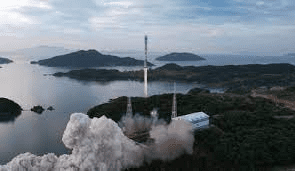Ukraine Faces “Hugely Worse,” According to the UN Aid Chief Humanitarian Situation Following Dam Breach
According to the senior relief official for the UN, the humanitarian situation in Ukraine is “hugely worse” than it was before the Kakhovka dam failed.
An “extraordinary” 700,000 people, according to Undersecretary-General Martin Griffiths, need access to clean water, and he warned that the effects of flooding in one of the world’s major breadbaskets will almost certainly result in lower grain exports, higher food prices globally, and fewer meals for millions of people in need.

He told The Associated Press in an interview that “this is a viral issue.” The fact is that we are only now starting to experience the effects of this act.
The Kakhovka hydroelectric dam broke and its reservoir on the Dnieper River was emptied on Wednesday, adding to the anguish of an area that has endured artillery and missile bombardment for more than a year.
The western bank of the Dnieper is held by Ukraine, while Russian forces are in charge of the low-lying, more flood-prone eastern bank. The dam and reservoir are located in the Kherson area, which Moscow unlawfully invaded in September and has been occupying for the last year. It is crucial for fresh water and agriculture in southern Ukraine.
According to Griffiths, the UN has reached 30,000 individuals in regions under Ukrainian authority that have been inundated by working mostly via Ukrainian assistance organisations.
He said that up to this point, Russia has refused to let the UN to assist flood victims in any of the territory it manages.
Vassily Nebenzia, the Russian ambassador to the UN, was the person Griffiths claimed to have spoken with on Wednesday to request permission from the Russian government “for our teams in Ukraine to go across the front lines to give aid, to provide support for… Ukrainians in those areas.” He said, “I hope that will come through.”
The immediate reaction is crucial to save lives, he added, “but behind that you’ve got a huge, looming problem of a lack of proper drinking water for those 700,000 people” on both the Ukrainian-controlled and Russian-controlled banks of the river.
Additional issues include the flooding of significant agricultural area and the impending challenge of supplying cooling water for the biggest nuclear power station in Europe, Zaporizhzhia, which had been supplied by the dam.
Griffiths also pointed out that seas had rushed across regions where land mines from the conflict still remain, endangering both adults and children. “We are bound to be seeing those mines floating in places where people don’t expect them,” Griffiths said.
Accordingly, he said, “it’s a cascade of issues, starting with allowing people to survive today, and then giving them some kind of prospects for tomorrow.”
Griffiths said that because of the extensive effects, “it’s almost inevitable” that the UN would issue a special request for more assistance funding for Ukraine to cope with “a whole new order of magnitude” as a result of the dam’s failure.
However, he said that he wanted to hold off on making the plea for a few weeks to assess the effects on the economy, public health, and the environment.
The Black Sea Grain Initiative, which Turkey and the UN mediated with Russia and Ukraine last July to open three Black Sea ports in Ukraine for its grain exports, is being extended, according to Griffiths and UN Trade Chief Rebeca Grynspan.
The UN and Russia signed a memorandum as a part of that agreement to remove barriers in the way of Russian food and fertiliser supplies, which Moscow has frequently said are not being carried out.
Reopening a pipeline that has been closed since Russia’s invasion of Ukraine on February 24, 2022, between the Russian port of Togliatti on the Volga River and the Black Sea has been a crucial Russian demand. It included ammonia, an important component of fertiliser.
We all consider it a top priority to open that pipeline and transport ammonia over the Black Sea to the developing world, Griffiths added. “A key component for ensuring the security of the world’s food supply is ammonia.”
Late on Tuesday, there was a report of a pipeline break caused by shelling, but Griffiths said the UN couldn’t corroborate it since the pipeline is located in the centre of a conflict area.
We naturally have the firm belief that we must get things fixed as soon as possible, he said. So, let’s hope the damage isn’t too severe.







